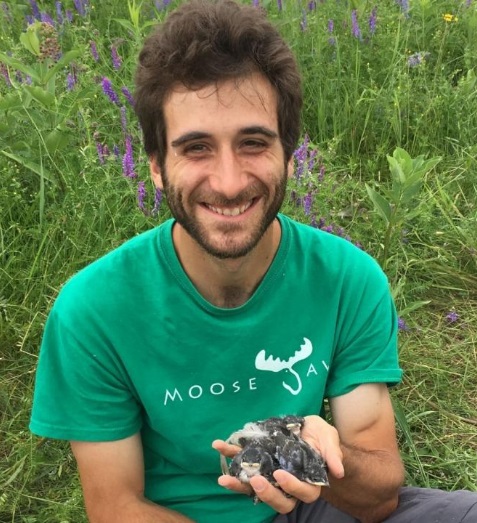
Simon Tapper's research explores temperature regulation in tree swallows
2020 was quite a year for Simon Tapper. Not only did he complete his Ph.D. in Environmental and Life Sciences (ENLS) and publish two first-author research papers, but he also became a first-time dad. "My son was born the day after I defended my thesis," says Dr. Tapper.
Coincidentally, his thesis deals with parenting, though not of the human species.
Dr. Tapper studied the effects of temperature on the parental care of tree swallows breeding in the Trent Nature Areas and the Lakefield Lagoon, where Trent has nest-box breeding birds. "My research looked at how these birds are able to regulate their body temperature when exercising and how this interacts with the ambient temperature and affects their parenting behaviour," explains Dr. Tapper.
Increase in body temperature compromises birds' endurance to feed nestlings
Dr. Tapper used relatively new and less invasive methodologies to identify the birds, record their body temperature, and monitor the time they spent feeding their offspring. He found the more the birds exerted themselves feeding their chicks, the higher their body temperature became, and the more they slowed down.
After trimming the belly feathers of one subset of birds - to simulate the removal of a sweater - Dr. Tapper noted this group had more endurance to feed their young to the same intensity in hotter weather. Without such intervention, however, parents tend to focus on self-preservation first. "That suggests that with global warming we might expect the parental care to decrease, especially during heatwaves, and that could mean less breeding success in the future," says Dr. Tapper.
Evolution from primatology to avian ecology
Dr. Tapper got his academic start at the University of Toronto in biological anthropology, which led him to the field of primatology, the study of monkeys and apes. He completed his Master's at the University of Roehampton in London, England and spent time in Morocco conducting fieldwork on how tourism affected the stress physiology of a colony of Barbary Macaque monkeys living in Ifrane National Park.
Wanting to return to Canada for his doctorate, Dr. Tapper realized that staying with primate research would have limited his career options to academia. He started looking for people at Canadian universities, close to Ottawa in particular, who specialized in physiology stress and conservation biology.
He found those experts at Trent University, and switched his focus from monkeys to birds. His supervisor, Dr. Gary Burness, specializes in physiology stress and his co-supervisor, Dr. Joe Nocera, is a formerly species-at-risk biologist with the Ontario Ministry of Natural Resources and Forestry (OMNRF) and now associate professor at the University of New Brunswick.
Natural surrounding areas perfect for field research
Trent's location in the Kawarthas also offered many diverse natural areas for Dr. Tapper to explore. Other attractions were the University's excellent research reputation and close connection to the OMNRF.
"I liked that Trent afforded the opportunity to draw on expertise and resources from both Trent faculty and Ontario government biologists, and its one advantage I've been able to make use of throughout my degree," he says.
Excellent mentorship from many sources
Dr. Tapper has high praise for the outstanding mentorship and support he received from Professors Burness and Nocera. "I've also received sound guidance from a number of additional Trent faculty, including Dr. Erica Nol, Dr. Aaron Shafer, and Dr. Dennis Murray, and have been able to generate and develop new study ideas through collaborations with lab members," says Dr. Tapper.
While considering what's next in his career, Dr. Tapper is keen to continue with wildlife research. "Regardless of the position, I would like to use science to influence policy related to climate change, wildlife management, or social issues," he says.
One of Dr. Tapper's publications was short-listed for the 2020 JEB Outstanding Paper award, and also won Editor's Choice for May 2020. These awards acknowledge the seminal contributions of young scientists at the beginning of their careers.
Learn more about Environmental and Life Sciences at Trent. Applications are still being accepted for fall 2021.












